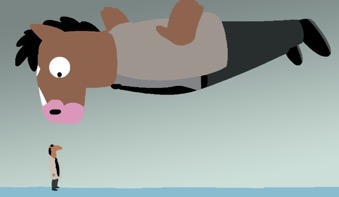In Defense of The Weird Horse Cartoon
A Deeper Look Into Netflix Original Series Bojack Horseman

With the overwhelming number of Netflix Originals available, it’s easy to watch a show you might regret and miss one that you might have loved.
Netflix’s confusing algorithm lends itself to advertise shows the wrong way, or to advertise the wrong shows altogether. Many programs have been victims of this mis-marketing, but perhaps none more egregiously than BoJack Horseman.
“BoJack Horseman? Isn’t that the weird horse cartoon?” You might ask. You wouldn’t technically be wrong, but BoJack is a lot more than what is depicted in its various Netflix thumbnails.
At first glance, BoJack appears to be another Adult Swim-type show with lewd jokes that are too risque for daytime television. In actuality, it’s way more than that; BoJack covers the topic of mental health, and does so much more delicately and realistically than most live-action series.
BoJack Horseman’s first half of the final season premiered on October 25, so now is a perfect time to spotlight the show, which many Netflix users have unfortunately ignored for years.
The show centers on the story of the titular character, a washed-up Hollywood celebrity horse who can’t seem to let go of his sitcom past. The series begins with BoJack struggling to write his memoir. His publishing company provides him a ghostwriter named Diane Nguyen, and the first season largely revolves around the writing of the book.
BoJack’s agent, dazed roommate, and Labrador retriever all serve as main characters as well. These characters are all multi-faceted, and their personalities and values evolve as the show progresses.
Although BoJack is a comedy, the show has a darker side that may go unnoticed upon first viewing.
Besides his life as a Hollywood has-been, BoJack is also an alcoholic, a drug addict, and a product of childhood abuse. The show’s creators are not scared to touch upon these darker topics and include scenes of disorienting drug sequences and flashbacks to Bojack’s disturbing and neglectful childhood.
As a result of Bojack’s upbringing, he is mean, nihilistic, pessimistic, and mistreats those close to him.
Although critics have praised the show for its honest depiction of mental illness, BoJack Horseman is not usually lauded by the general public, but that is because most haven’t seen the show.
The show speaks to those with their own mental health concerns; many of my friends who sometimes struggle from mental health issues love the way BoJack tackles them. One of my friends who suffers from severe mental health issues is in rehabilitation right now, and this was his favorite show.
He’ll be missing the season six premiere, so I’ve decided not to watch it without him.
BoJack Horseman has touched the lives of its audience through the jokes, relatable characters, and respectful portrayal of mental health. It’s a show that a majority of people may have ignored due to Netflix’s algorithm and misleading advertisements, but I urge everyone to give this show a chance as its sixth (and final season) premieres.

This is Gab’s second year on the Banner and first as a section editor! She loves writing about her random passions, which is why she loves A&E so...

